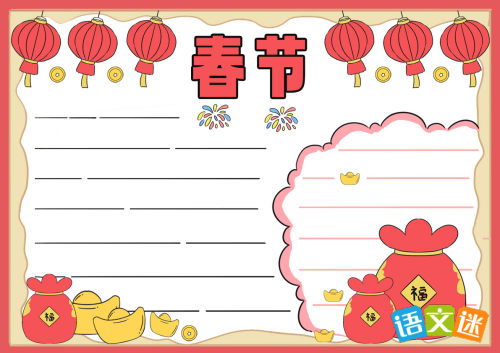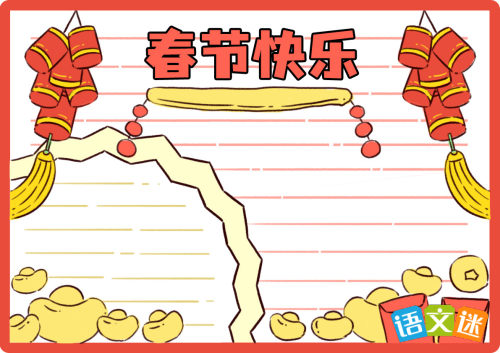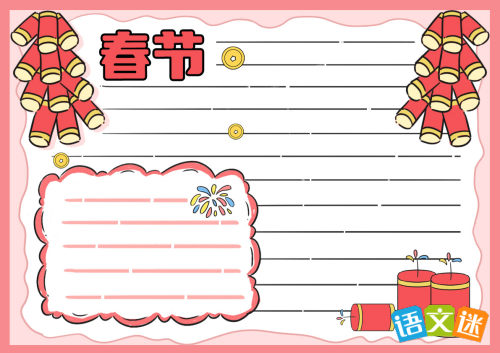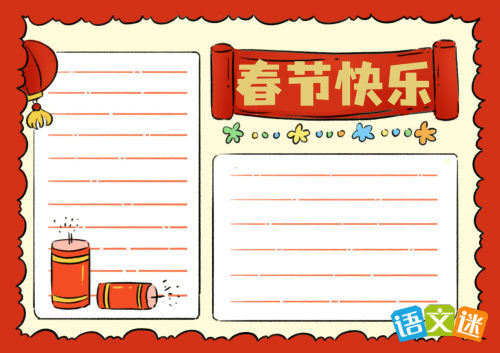- 相关推荐
春节来历英语手抄报
春节的另一名称叫过年,是中国最盛大、最热闹、最重要的一个古老传统节日,本文为大家整理了春节来历英语手抄报,仅供参考!
春节来历英语手抄报





春节来历英语
The origin of the Spring Festival
About the origin of the Spring Festival have been many, including several representative said, Spring Festival originated from the Greek Festival, originated from the witchcraft ceremony said, from Halloween said, [3] is one of the most widely accepted view is Chinese new year by the rise period.
On one day of 2000 BC, Shun, the son of heaven, led the subordinates and worshiped the heaven and earth. Since then, people put on this day as the beginning of the year. It is said that this is the origin of the lunar new year, and then it is called the Spring Festival.
The time evolution of the Spring Festival
Before the Spring Festival, also called the new year's day, is on the first day of the first month. The setting dates of the Chinese calendar months are not the same.
Used in the Xia Dynasty (i.e. the first lunar month) for the first month.
The Shang Dynasty (December) for the first month in the twelfth lunar month.
After the unification of the six countries, Qin Shihuang stipulated that the October was the positive month, and the Qin calendar was used in the early Han Dynasty.
Beginning the first year of emperor, namely, 104 BC, astronomer Luoxia Hong, Deng Ping et al. Developed a "tachu calendar", originally in October at the beginning of the year to year in the later, basically is gradually perfect today for our use of the lunar calendar (lunar), also known as the "Spring Festival Luoxia Hong elderly". Since then Chinese has been used (also known as the lunar calendar, the lunar calendar), until the Qing Dynasty, up to 2080.
The change of the name of the "Spring Festival"
In different times, there are different names for the Spring Festival.
In the early Qin Dynasty called "day", "new year", "change", "new year"; to the Han Dynasty, also called the "Three Dynasties", "Old Dan", "it is", "day"; in the northern and Southern Dynasties called "magic", "new year", "head of state", "year old"; in the Tang and Song Yuan Ming, known as the "new year", "Yuan" and "old" and "new" and "new"; and the Qing Dynasty, has been called the "new year" or "the Lunar New year".
It is a matter after the revolution of 1911 to officially name the lunar new year as the Spring Festival. The Republic of China during the period of Beiyang government, as the time to switch to the solar calendar, in order to distinguish between agriculture, Yang 2, Yuan Shikai will be the new year's Day is defined as 01 calendar month 01 days, will be renamed in the 1th day of the first month of the Chinese Lunar calendar for the spring festival.
The evolution and development of the Spring Festival
In the pre Qin period, there was a rudiment of the age of age. "Happy scene Zaiyang wine poetry," Bin wind in July were recorded in October by the people after harvest, "rice, this spring, with bushy eyebrows....... October Ditan,... To kill the lamb,... A long life."
In the Han Dynasty, the ancestor worship was an important activity and custom of the Spring Festival. The "people" to this Cui April mentioned that "the first month of Dan, is that is. Bow to your wife and children Xie rate." The custom of passing the new year at the beginning of the month is becoming more and more abundant.
Wei and Jin Dynasties, has formed the custom of new year's Eve staying-up late on new year's eve. The Jin dynasty recorded Zhou Chu's "local mind": New Year's Eve people giving each phase, called "fed"; old poly Huan, praise complete, called "points"; do sleep, waiting for the dawn, "said staying-up late on new year's eve".
During the Tang Dynasty, people in addition to the invention of a "pay New Year's call, but also pay New Year's call". Tang Taizong Li Shimin with red cards made of beaten gold, Yushu, "celebrate", given the minister. This form of folk rapidly in popularity, with plum paper. At that time, this "New Year's post" was called "flying post".
The new year began to eat dumplings, the dumplings called "slot". The Song Dynasty has generally begun to make firecrackers with paper gunpowder. The custom of putting off firecrackers on New Year's Eve and Spring Festival is becoming popular. "Tokyo menghualu" said: "this is the night, fireworks ban Shan Hu, heard on the outside." To the Ming Dynasty, the kitchen god, posted goalkeeper, new year's Eve, fifteen Shangding staying-up late on new year's Eve has prevailed. "Records of Wanli Jiaxing's history": "New Year's Eve, easy goalkeeper, Taofu, spring Esther, inokuma are sealed. Burnt firecrackers, purple, wine and fruit drink that night, gongs and drums, staying-up late on new year's eve."
The Qing government attached great importance to the Chinese new year, Chinese New Year is very luxurious palace, the emperor wrote "give the ministers of the customs. The new year will continue until the end to the Lantern Festival, lantern riddles very popular is fun.
The 1911 Revolution has brought a new era, the government advocated the new calendar, traditional New Year holiday no longer. Etiquette, hat, bow, shake hands, clapping and other new etiquette has gradually become Chinese interpersonal civilized ritual".
【春节来历英语手抄报】相关文章:
汉字来历的手抄报08-29
汉字的来历手抄报08-29
关于年的来历手抄报07-06
电脑的来历手抄报内容09-04
春节英语手抄报09-16
春节的英语手抄报09-19
端午节的来历手抄报08-30
春节的来历01-09
春节的来历08-27
